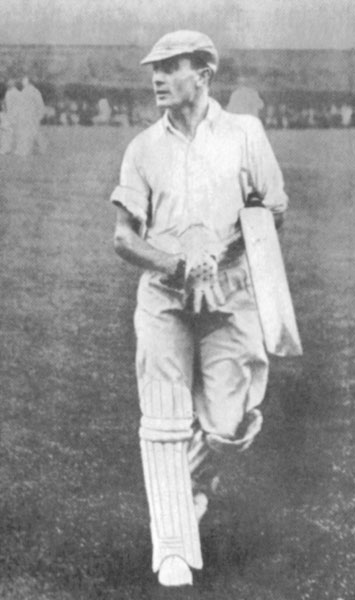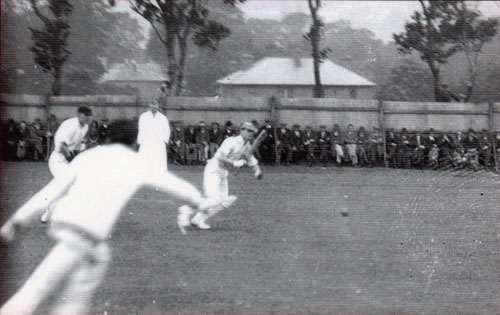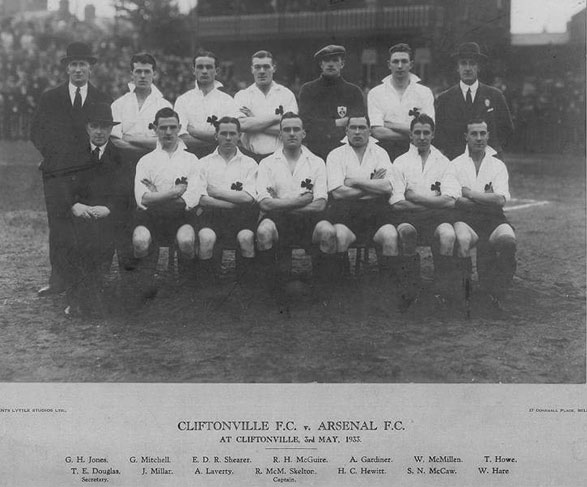
Edward Donald Reid Shearer, born at Harrow-on-the-Hill, Middlesex on 6 June1909, spent virtually all of his sporting life in Derry, coming to Northern Ireland's second city in the 1920's.His father, who was a London agent for a textile empire, died when he was at school and his company later employed the young Shearer. He was immediately dispatched to Derry to learn the textile trade. He arrived in the city at a time when Derry was the centre of the industry, employing 8000 local women.
Shearer arrived, almost unnoticed in Derry but by the time his sporting career ended he was a household name in Ireland and beyond. His record both as a cricketer and a footballer is outstanding.
In those cricketing summer of long ago he was City of Derry's talisman and a free-scoring batsman with Ireland from 1932 to 1952; as a footballer he helped forge part of Derry City's history as a member of Billy Gillespie's great 1930's team.
Of course when he first arrived in Derry, Derry City Football Club did not exist. Shearer later explained how he became a Derry City player.
"The company sent me to London for two years from 1929 to 1931 to learn the selling end of the business," he explained. " I played football for the Hon. Artillery Company, was noticed by Corinthian Casuals, and before I returned to Derry, I had toured Switzerland with them as well as playing against Arsenal."
"I had been a member of the City of Derry Rugby Club in my first spell in Derry and in the interim period the football team had been formed and the chairman Sir Dudley McCorkell asked me to sign."
Sir Dudley was forced however to accept an important clause in his contract. Shearer's arrangement with the English amateur side, Corinthian Casuals, was that if they ever required him they would have automatic preference and he signed for Derry City on that condition.
It later explained why he missed one of the fledgling Irish League Club's greatest moments, the 1936 Irish Cup final defeat by Linfield.
"Because of this stipulation I missed the 1936 Irish Cup final and replay against Linfield at Celtic Park. I was in Hamburg with Corinthians," he pointed out.
"There was some disapproval from Derry fans, one of whom wrote a critical letter which he signed - 'Permanent-or- nothing'."
 Going out to bat for City of Derry
Going out to bat for City of Derry
Although that agreement curtailed his appearances for Derry City he was nevertheless a dedicated performer for the club and in the nine years from 1931 to 1939 he was a great favourite among the club's supporters. During that period he scored 75 goals for Derry, forming with the legendary Jimmy Kelly a formidable striking partnership.
Shearer made his debut against Coleraine early in the season 1931-32. The game against the Bannsiders ended in a draw. For the next eight years the skilful, dashing Shearer was to be an automatic choice for the team at centre forward - when available. The club's annual report at the end of the previous season had recorded an average home gate of £142 - an average attendance of 4,200.
Frank Curran, former Derry Journal editor, underlined the status Shearer held in local sport. "He was the superstar of that period," said Frank.
And no wonder! Shearer played on the Irish League team that beat the English League 2-1 at Blackpool in 1935 and a year later he was also on the Irish League side that repeated the feat at Windsor Park, again upsetting the odds with a 3-2 victory against a very strong English League line-up backboned by many internationals.
The Irish League team at Blackpool in 1935 contained three players from Derry City. This was how it lined out: Scott (Belfast Celtic), Millar (Glentoran), Allen (Cliftonville), McCullough(Belfast Celtic), Jones(Linfield), capt, Brown (Derry City), Kernaghan (Belfast Celtic), Shearer(Derry City), McNally (Distillery), Conwell (Portadown), Kelly (Derry City). McNally and Kelly got the goals.
Donald Shearer was an amateur sportsman in the true sense. He never took a penny or any expenses for playing for Derry. He played for the love of football and cricket.
Frank Curran said that in this regard there was an interesting sidelight: "He made an arrangement with Derry City that when he played, the player left out of the side because of his inclusion was to be paid the bonus money if Derry won."
Shearer was capped seven times as an amateur by England and in 1934 won an FA Amateur Cup medal with Corinthian Casuals. He was also a member of the British team at the 1936 Olympic Games in Berlin.
"I was in the opening parade with Hitler on the rostrum," he told the Belfast Telegraph's distinguished football writer, Malcolm Brodie. "We didn't give the Nazi salute, like many others, but turned eyes right."
His football prowess was such that he had offers to sign professional for several English clubs including the Arsenal but he opted to stay amateur and remain at the Brandywell.
He made his debut in North West cricket in April 1927 scoring 50 for City of Derry against Knockdara on a snowy pitch. After several years in England he returned to the City of Derry line up in 1931 and went on to compile 11 centuries in eleven years for the west bank club.
The cricketing officials in Belfast and Dublin were dismissive of the standard of play in the North West of Ireland Union area. No player from this corner of the island had been capped since Ireland began playing in 1855 but when word spread of young Shearer's talent they had no option but to select him. Indeed in 1932, when it was clear his case could no longer be ignored and he was expected to gain his first Ireland call-up, the Leinster branch objected on the basis that a rule was being broken - a player had to have played inter-provincial. However, on the day before the selectors met Shearer took 80 in an hour off two of Ireland's truly great bowlers James Boucher and Edward Ingham; the objection to his Ireland selection was immediately withdrawn.
He was the first - (1937) - to score 300 runs in a season for Ireland.
Shearer's Ireland cricket reign included games against Derbyshire, Yorkshire, Lancashire and the Australians during their 1938 Irish tour when they took on the Irish at Ormeau and Trinity College.
One man whom Shearer always wanted to play against was the immortal Don Bradman but he didn't get that opportunity when the Aussies came to Ireland. "I never met or played against Don Bradman, who remained in London and didn't accompany the team to Belfast in 1938," he said.
"Bradman was a magnificent batsman, as Jack Fingleton once said 'on and on he seemed to go, batting into eternity' - nothing flash, but he always hit the ball between the fielders and not at them."
Shearer also admired the great Australian spin bowler, Bill O'Reilly. "I got 56 against him in a match in which Ireland were all out for 100," he recalled years later. "What a bowler - he was so tall he could spin the ball anywhere … he never gave you a chance."
That innings against O'Reilly in Dublin in 1938 deserves special mention for it underlined Shearer's skill as a batsman. Wickets were going down at the other end in the late evening but Shearer was the equal of the outstanding Australian bowler. No Irishman had made double figures but EDR using his feet to drive and glance defied the great Aussie spinner for three hours in scoring that memorable 56.
Shearer was the first Irish batman to score four successive half centuries (1937). He was also the first North West Union player to score a century for Ireland (102 in 80 minutes versus Sir Julian Cahn's XI at Notts in 1937.) And he set another mark in that game becoming the first Irish player to score a century and a half century in the same match.
He played 32 times for Ireland and one of those games included a rare distinction - a century against the MCC at Lords. That knock of 101 not out in 1951 was the first century by an Irish batsman at cricket's most famous venue. It was 1951 and he was 42 years of age.
In 58 innings for Ireland he scored 1300 runs including two centuries and eight fifties and his average was 23.21 - a respectable achievement as many of his appearances were against professional opposition. He was not out twice and took 27 catches.
He qualified to play for Ireland because he was resident in the country.
He was rated Ireland's outstanding batsman between the two World Wars. He was once introduced to the great West Indian, Everton Weekes at a private dinner party. Weekes said to him "You know all great batsmen are small men - Bradman, me and you!"
He was the first player in the North West Union to score a century in the Senior Cup final. The year was 1932 - 44 years after the first final in 1888.City of Derry were pitted against St Johnston with the decider being played over three Saturdays beginning 30 July. The Los Angeles Olympics were declared open the same day. Shearer was absent on day one playing for Ireland and City of Derry bowled St Johnston out for 114. City's response was poor - 62 for 7 when stumps were drawn. The following Saturday, with Shearer present, City could manage only 94 on the completion of their first innings. Shearer was undefeated on 18. His Derry City colleague Jimmy Kelly top scored with 22. St Johnston compiled a good second innings of 196 that included a fine knock of 68 by Tommy Orr to lead by 216 runs.
Play resumed on Saturday 13 August - the same day in Berlin Hitler refused to serve as vice-chancellor under Van Papen - and City had two men to thank as they edged towards the formidable target. A partnership of 151 between Chambers and Shearer put City on the way to victory. Shearer scored 110 - the first time a ton had been scored in the Senior Cup final. When Shearer finally lost his wicket - caught Rankin bowled Orr - only a few runs were needed to wrap up the victory. City of Derry's winning margin was a comfortable five wickets.
 The Cliftonville side that played Arsenal in 1933.
The Cliftonville side that played Arsenal in 1933.
In 1933 he set a score that has never been beaten in North West Union cricket, scoring 233 versus Killaloo. It was the first time a North West player had scored a double century. He was also the first North West player to score a century in seven successive seasons (1932-38).
EDR Shearer married a Derry girl, Hester Cooke in 1935, and they had three daughters.
In World War Two Shearer was mentioned in dispatches while serving with the 8th Army in the western desert in Palestine. He was Marshall Montgomery's garrison commander in Tobruk.
Tony Diver recounted an interesting story about Shearer in Waterside Voices in the Autumn of 2006 He told of Shearer's last football match. Tony's uncle, George Diver, had been Shearer's driver and batman during World War Two.
His final football outing took place in Tobruk. Shearer got a team together to take on an eleven trained by the immortal Everton centre-forward William Ralph 'Dixie' Dean, who incidentally towards the end of his career played with Sligo Rovers.
The game was played in intense heat and on a hard surface. Shearer's team won the match but the former Derry City centre forward was physically drained.
Shearer took up the story: "We beat them 2-1 and I had a wonderful batman and driver, George Diver from Shantallow. He had watched the match and said 'I think you've had it sir.' He had not been too impressed so I decided to drive down to the water and throw my boots in the sea"
Thus ended the football career of a man who had been very much part of the emerging Irish League club, Derry City, during their formative years in the 1930's.
In later life he was the first chairman of the Northern Ireland Sports Council. He was an accomplished leader ensuring the council remained an independent voice. The Belfast Telegraph's Malcolm Brodie said Shearer was very much his own man. He was the bane of civil servants. He told Malcolm that Civil Service bureaucracy drove him mad.
"I had been used to getting things done but it was very difficult on the council with its Civil Service red tape," he said.
"I was disappointed not to have been re-elected as I felt I could have achieved something more for sport."
Edward Donald Reid Shearer died on 9 July 1999 at Sudbury, Suffolk, England.
